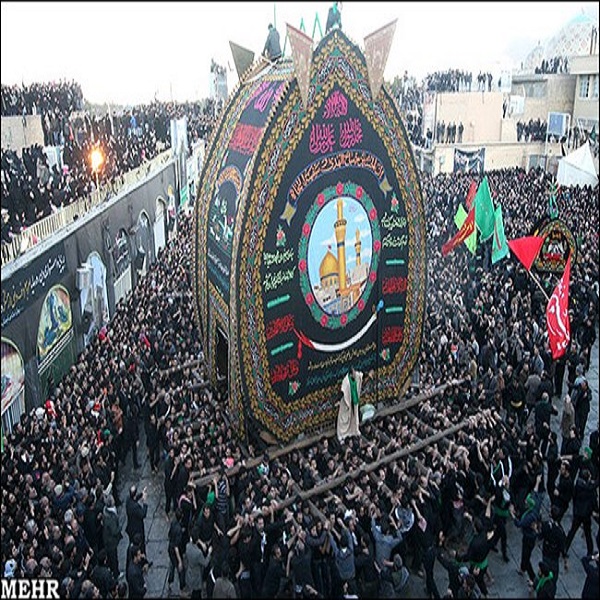 The tenth day of Muharram is the Day of Ashura, which to Shia Muslims is part of the Mourning of Muharram. Sunni Muslims fast during this day, because it is recorded in the hadith that Musa (Moses) and his people obtained a victory over the Egyptian Pharao on the 10th day of Muharram; accordingly Muhammad asked Muslims to fast on this day that is Ashura and on a day before that is 9th (called Tasu'a). Shia Muslims mourn the death of Imam Hussein and his family, respecting the sacrifice of the martyrs by praying in abundance and refraining from all joyous events.Muḥarram is the first month of the Islamic calendar. It is one of the four sacred months of the year. It is held to be the holiest month, Ramadan coming after. The word "Muharram" means "forbidden". Since the Islamic calendar is a lunar calendar, Muharram moves from year to year when compared with the Gregorian calendar.
The tenth day of Muharram is the Day of Ashura, which to Shia Muslims is part of the Mourning of Muharram. Sunni Muslims fast during this day, because it is recorded in the hadith that Musa (Moses) and his people obtained a victory over the Egyptian Pharao on the 10th day of Muharram; accordingly Muhammad asked Muslims to fast on this day that is Ashura and on a day before that is 9th (called Tasu'a). Shia Muslims mourn the death of Imam Hussein and his family, respecting the sacrifice of the martyrs by praying in abundance and refraining from all joyous events.Muḥarram is the first month of the Islamic calendar. It is one of the four sacred months of the year. It is held to be the holiest month, Ramadan coming after. The word "Muharram" means "forbidden". Since the Islamic calendar is a lunar calendar, Muharram moves from year to year when compared with the Gregorian calendar.
During Muharram, Shia Muslims do different things and with different intentions. Shia Muslims observe and respect Muharram as the month that martyred Hussein ibn Ali, the grandson of Muhammad and son of Ali, in the Battle of Karbala. They mourn for Hussein ibn Ali and refrain from all joyous events. Unlike Sunni Muslims, Shias do not fast on the 10th day of Muharram. Inaddition there is an important Ziyarat book, the Ziyarat Ashura about Hussein ibn Ali. In the Shia sect it is popular to read this ziyarat on the "Day of Ashura", although most of the Shias try to read Ziyarat Ashura every day and they send salutations to Hussein ibn Ali.
Muharram and Ashura
The first month, Muharram, is one of the four sacred months that Allah has mentioned in the Quran: Muharram, Rajab, Dhu al-Qi'dah, and Dhu al-Hijjah. Even before Islam came, Quraish and Arabs as a whole knew the sanctity of the months and were forbidden to wage war on those months.
Muharram and Ashura to the Shia
Muharram is a month of remembrance and modern Shia meditation that is often considered synonymous with Ashura. Ashura, which literally means the "Tenth" in Arabic, refers to the tenth day of Muharram. It is well-known because of historical significance and mourning for the murder of Hussein ibn Ali, the grandson of Muhammad.
Shiite begin mourning from the first night of Muharram and continue for ten nights, climaxing on the 10th of Muharram, known as the Day of Ashura. The last few days up until and including the Day of Ashura are the most important because these were the days in which Imam Hussein and his family and followers (including women, children and elderly people) were deprived of water from the 7th onward and on the 10th, Imam Hussain and 72 of his followers were killed by the army of Yazid I at the Battle of Karbala on Yazid's orders. The surviving members of Imam Hussein's family and those of his followers were taken captive, marched to Damascus, and imprisoned there.
Incidents occurred during this month
- 1 Muharram: anniversary of the death of Hazrat Ammasaheb Bibi Habiba Qadri in India; Seizure of the Grand Mosque in AH 1400.and also Hazrat Umar 2nd caliph of Islam was martyred on 1st Muharram
- 2 Muharram: Hussein ibn Ali enters Karbala and establishes camp. Yazid's forces are present.
- 7 Muharram: Access to water was banned to Husayn ibn Ali by Yazid's orders.
- 10 Muharram: Referred to as the Day of Ashurah (lit. "the tenth") was the day on which Hussein ibn Ali was martyred in the Battle of Karbala. Shia Muslims spend the day in mourning, whilst the Sunni Muslims fast on this day commemorating the rescue of the people of Israel by Musa (Moses) from Pharaoh.